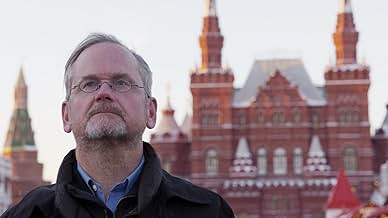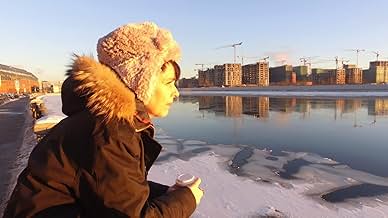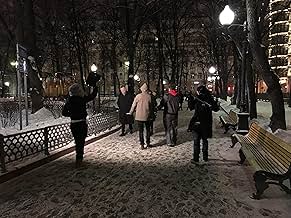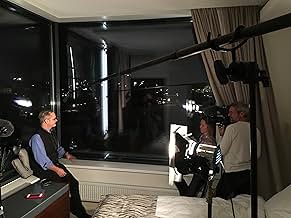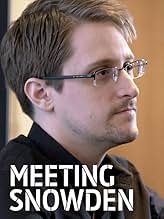Global activists Snowden, Jonsdottir, and Lessig discuss democracy's future, their struggles, its fragility, and potential solutions in a candid conversation amidst Snowden's precarious situ... Read allGlobal activists Snowden, Jonsdottir, and Lessig discuss democracy's future, their struggles, its fragility, and potential solutions in a candid conversation amidst Snowden's precarious situation.Global activists Snowden, Jonsdottir, and Lessig discuss democracy's future, their struggles, its fragility, and potential solutions in a candid conversation amidst Snowden's precarious situation.
Storyline
Featured review
"A poet, a lawyer and a geek walk into a bar and they ask themselves: why we believe in democracy anymore?" This is what Lawrence Lessig says in the documentary "Meeting Snowden" (2017, France, 52 min.). Lessig is the lawyer, Birgitta Jonsdottir is the poet and Edward Snowden is the geek. They all sit around a small table in a hotel room and Moscow and talk about democracy.
The film was made while Trump was about to take over the presidency and there were some that Russia could hand over America's most wanted whistleblower if Trump was to kindly ask Putin to do so. Fortunately, it didn't happen and the Russian authorities extended Snowden's residence until 2020. Recently, Putin said that Snowden did a bad thing when he revealed NSA secrets, but he agrees that he served his country when he did that.
Uninformative, but meditative
Compared to other documentaries and feature films with or inspired by Snowden, this one is less informative. You will not know more about the American whistleblower that you already knew and there aren't any mind blowing revelations. This documentary is rather an essay, a series of reflections about means democracy today, in the era of technology and global surveillance.
If "Citizenfour" is an informative and full of suspense documentary, "Killswitch" (2014) is an introduction to the subject of global mass surveillance and "Snowden" (2016) is a biographical attempt, "Meeting Snowden" only wants to make you think about the relationship between the state and the citizens in today's societies. Lessig says that, in the USA, people "act as if they lived in a democracy". Then he makes an aggressive comparison with the Soviet regime in the '70s.
During the debate in the hotel room, the three activists come to talk about the different ways in which people are manipulated today. They agree that fear is imposed today through the constant repetition of the terrorist menace. But let's not forget that, after Snowden's revelations, the US government admitted that they never caught a terrorist using the intrusive surveillance systems that they have been using for 10 years.
For a person who doesn't know much about Snowden and his exile stories, the documentary is a history and democracy lesson. But those who follow the Snowden subject since the activist caught the public eye will be disappointed.
In this film, Snowden seems tired, passive and his discourse is corny and fade. Lessig tries several times to add some spice to the discussion, but Snowden is not aware of that. Birgitta Jonsdottir's contribution is very low, but her opinions in the introduction and the final part of the movie are valuable.
Quotes
"It's so easy today to divide people! Look at the narrative about Russia and the United States." — Birgitta Jonsdottir
"Citizens of US don't see the unconstitutional mass surveillance laws; they see an individual challenging the stability, the structure, the dignity, the reputation of the government class". — Edward Snowden
"Fear works as a political strategy. Invoke terrorism and freedoms will evaporate." — Edward Snowden
"Ordinary people can do extraordinary things." — Edward Snowden
The film's structure
The film has an introduction, with a background of the meeting in Moscow; also, there is an introduction about Snowden, for those who don't remember who he is. The discussion in the hotel room follows, interrupted by short behind-the-scene moments (Snowden clapping his hands when the shooting starts, recalibrating the cameras etc.) and some general opinions close the film.
There are a lot of images with the streets and buildings of Moscow. The final sequence is a mix of the most recent street protests around the world, including those from Romania from the beginning of this year.
See the movie at ARTE.TV.
The film was made while Trump was about to take over the presidency and there were some that Russia could hand over America's most wanted whistleblower if Trump was to kindly ask Putin to do so. Fortunately, it didn't happen and the Russian authorities extended Snowden's residence until 2020. Recently, Putin said that Snowden did a bad thing when he revealed NSA secrets, but he agrees that he served his country when he did that.
Uninformative, but meditative
Compared to other documentaries and feature films with or inspired by Snowden, this one is less informative. You will not know more about the American whistleblower that you already knew and there aren't any mind blowing revelations. This documentary is rather an essay, a series of reflections about means democracy today, in the era of technology and global surveillance.
If "Citizenfour" is an informative and full of suspense documentary, "Killswitch" (2014) is an introduction to the subject of global mass surveillance and "Snowden" (2016) is a biographical attempt, "Meeting Snowden" only wants to make you think about the relationship between the state and the citizens in today's societies. Lessig says that, in the USA, people "act as if they lived in a democracy". Then he makes an aggressive comparison with the Soviet regime in the '70s.
During the debate in the hotel room, the three activists come to talk about the different ways in which people are manipulated today. They agree that fear is imposed today through the constant repetition of the terrorist menace. But let's not forget that, after Snowden's revelations, the US government admitted that they never caught a terrorist using the intrusive surveillance systems that they have been using for 10 years.
For a person who doesn't know much about Snowden and his exile stories, the documentary is a history and democracy lesson. But those who follow the Snowden subject since the activist caught the public eye will be disappointed.
In this film, Snowden seems tired, passive and his discourse is corny and fade. Lessig tries several times to add some spice to the discussion, but Snowden is not aware of that. Birgitta Jonsdottir's contribution is very low, but her opinions in the introduction and the final part of the movie are valuable.
Quotes
"It's so easy today to divide people! Look at the narrative about Russia and the United States." — Birgitta Jonsdottir
"Citizens of US don't see the unconstitutional mass surveillance laws; they see an individual challenging the stability, the structure, the dignity, the reputation of the government class". — Edward Snowden
"Fear works as a political strategy. Invoke terrorism and freedoms will evaporate." — Edward Snowden
"Ordinary people can do extraordinary things." — Edward Snowden
The film's structure
The film has an introduction, with a background of the meeting in Moscow; also, there is an introduction about Snowden, for those who don't remember who he is. The discussion in the hotel room follows, interrupted by short behind-the-scene moments (Snowden clapping his hands when the shooting starts, recalibrating the cameras etc.) and some general opinions close the film.
There are a lot of images with the streets and buildings of Moscow. The final sequence is a mix of the most recent street protests around the world, including those from Romania from the beginning of this year.
See the movie at ARTE.TV.
- George-Hari-Popescu
- Jun 23, 2017
- Permalink
Details
- Release date
- Country of origin
- Official site
- Languages
- Also known as
- Encontro com Snowden
- Filming locations
- Production companies
- See more company credits at IMDbPro
- Runtime52 minutes
- Color
Contribute to this page
Suggest an edit or add missing content


